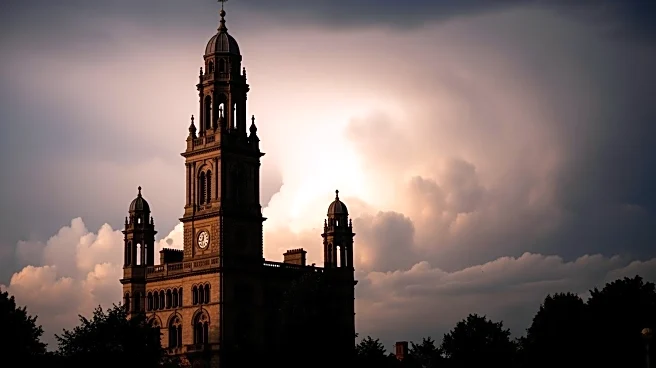What's Happening?
A historic building in Londonderry, known as the former Convent of Mercy, is facing potential demolition after being severely damaged by Storm Amy. The Georgian listed building, dating back to the early 1800s, was already in disrepair before the storm
exacerbated its condition. Structural engineers have declared the building in a 'state of imminent collapse,' posing a 'clear and immediate danger to life.' The Martin Property Group, which owns the building, has submitted a planning application for demolition, although no final decision has been made. Public safety is a priority, and discussions are ongoing to find a solution that preserves as much of the building's heritage as possible. Local traders have been affected by the partial street closure due to the building's instability.
Why It's Important?
The potential demolition of the Convent of Mercy highlights the challenges of preserving historical architecture while ensuring public safety. The building's deterioration raises questions about the maintenance and protection of heritage sites. The situation impacts local businesses, as the partial closure of Pump Street has led to a decline in trade. The decision on whether to demolish the building will affect the community's cultural heritage and economic activity. Preservationists and local authorities must balance safety concerns with the desire to maintain historical structures, which are integral to the area's identity and tourism appeal.
What's Next?
The Derry City and Strabane District Council is in discussions with the building's owner to address health and safety concerns while considering heritage preservation. The Department for Communities' historic environment division supports careful dismantling of parts of the building to mitigate risks. The Martin Property Group needs 'listed building consent' to proceed with any work affecting the building's character. The outcome of these discussions will determine the future of the building and its impact on the local community. Stakeholders are urged to explore all options to preserve the building's historical significance.
Beyond the Headlines
The situation underscores the broader issue of maintaining historical buildings in urban areas prone to natural disasters. It raises ethical questions about the responsibility of property owners and local governments in preserving cultural heritage. The case may prompt a reevaluation of policies regarding the upkeep of listed buildings and the allocation of resources for their protection. Long-term, this could influence how communities prioritize heritage conservation amidst modern development pressures.
















